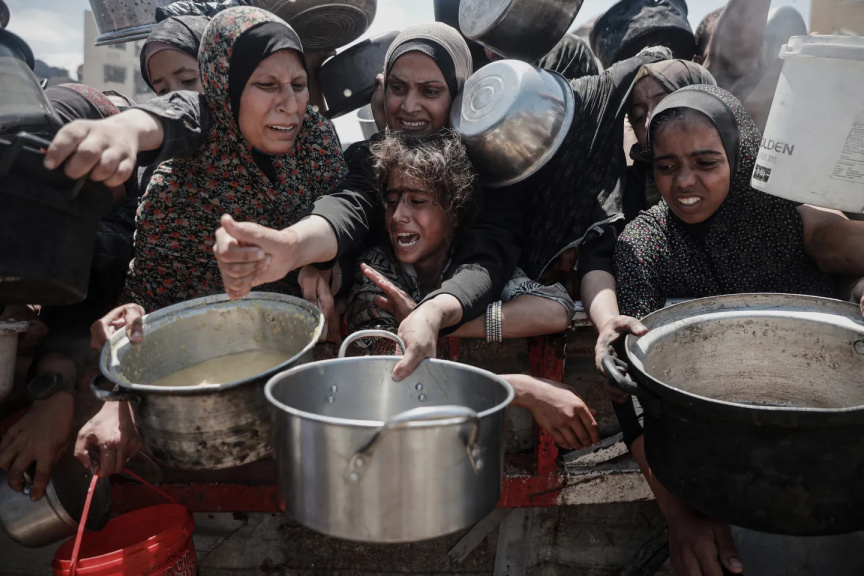
Palestinians gather to receive food from a charity kitchen. (Photo/AA)
Thousands of desperate civilians are struggling to get food aid in Gaza as deliveries have struggled to reach families, the World Food Programme (WFP) has said.
WFP Deputy Executive Director and Chief Operating Officer, Carl Skau told TRT World that the chaos has forced aid workers to rethink how supplies are distributed.
"We hope the food still reaches those in need, but that is not how we want to conduct our operations. This is not organised," he said on the sidelines of UNGA 80.
The UN's World Food Programme is the largest humanitarian agency delivering food aid around the globe.
"Thousands of desperate civilians are helping themselves (in Gaza). We are very concerned about it. We are working daily to return to the orderly distribution we used to maintain, all the way through the ceasefire in February and March," Skau added.
The aid disorder in Gaza reflects a wider crisis. Funding for the WFP has dropped by 40 percent this year, at a time when global hunger has reached historic levels.
"Two confirmed famines (Gaza and Sudan) have left over 300 million people acutely food insecure — almost the population of the United States," he noted.
'Enormous stress on UN'
Although conflict drives some of the crises, extreme weather linked to climate change is pushing needs even higher.
"In Afghanistan, two years ago, we assisted eight million people," Skau told TRT World.
"This year, it's down to two million. Malnutrition among children under five is spiking. Through this winter, children will die because of these cuts."
UN aid teams are facing impossible choices right now. WFP Chief Operating Officer describes how they must decide who receives help.
"A widow with more than five children might be prioritised; a widow with four children may not, even though she has no means to survive. Two of those four children could die this winter," he has said. "These choices put enormous stress on our teams."
The dangers extend to the staff themselves. Two months ago, three WFP workers were killed trying to reach al-Fasher in Sudan, a town under siege and stricken by famine. Two weeks ago, offices in northern Yemen were raided, leaving fifteen staff still in detention.
'Humanitarian law violated'
"The basic rules of the game, the international humanitarian law, are not being respected, and that's posing massive challenges to us as humanitarians," Skau said.
He emphasised that these challenges go beyond crisis countries. While conflict dominates headlines, other nations are taking steps to reduce hunger.
Brazil, India, and Indonesia, for instance, have expanded school meals to all children. Hundreds of millions of children receive nutritious meals, drawing them to school.
Yet even these successes remain fragile. Ending conflicts, preventing new ones, and sustaining gains are crucial, Skau emphasised.
"Hunger is not simply a lack of food; it is the product of politics, climate, war, and instability," he concluded.
___
Source:TRT